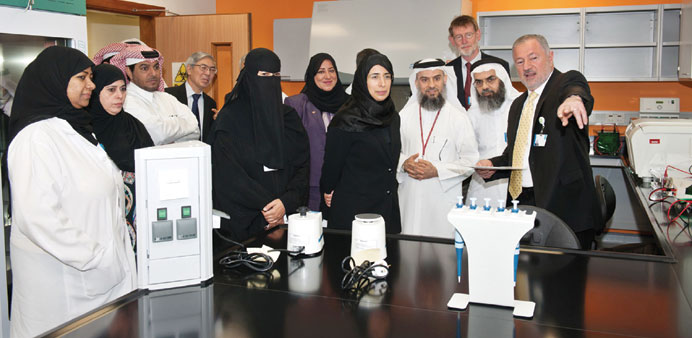|
Hamad Medical Corporation (HMC) has achieved a key milestone in its academic health journey with the opening of the Interim Translational Research Institute (iTRI). |
Located at Hamad Bin Khalifa Medical City, the iTRI will facilitate healthcare research in Qatar and enable the translation of scientific discoveries to aid the development of new medicines, technologies and treatments for the benefit of patients. The opening ceremony was attended by senior HMC officials and the Academic Health System Joint Steering Committee.
Dr Hanan al-Kuwari, managing director of HMC, said having the iTRI in place will enable the corporation to make key advances in research recruitment, training and education and research projects focusing on priority areas of the National Health Strategy, including cancer, diabetes, cardiovascular disease, genomics, respiratory medicine and neurosciences.
“HMC aims to ensure the safest and most effective care with services and treatments that are grounded in academic research, undertaken in state-of-the-art facilities by high-calibre clinicians and researchers.
“The iTRI has been much anticipated by our researchers at HMC and our collaborative partners in the Academic Health System. I look forward to seeing the research outcomes that will be supported through the iTRI, which will allow us to bring the latest innovations and clinical research closer to our patients,” Dr al-Kuwari said.
Dr Ibrahim Janahi, executive director of Research at HMC, said the iTRI enables better networking and collaboration among researchers, while allowing protected time for researchers to complete their research.
“It will also foster an environment in which physicians can learn how to do research; supporting the training and career progression of the next generation of clinical and scientific leaders in Qatar.”
The iTRI will provide core services to be managed by skilled facilities managers. The institute will house a clinical studies unit with consultation rooms, waiting areas and administrative and office space for clinical staff; wet laboratories to enable HMC scientists and researchers to do pre-clinical, translational research; and a seminar and meeting room to promote formal and informal learning, collaborations and development of research topics.
Professor Ramzi Mohamed, head of Research, Internal Medicine, at HMC and the newly-appointed director of the iTRI, said the institute will provide “a much-needed centralised facility for many of our physicians who love to do research but have previously had limited space to do so”.
“It will also provide an excellent opportunity for young Qataris to acquire the research experience they need in order to be accepted to higher education programmes, and help us produce a new generation of physician scientists who will be assets to HMC’s future as an academic health organisation.”
“The first floor is designated for clinical research, where physicians can see patients and collect data, while the second, third and fourth floors provide dedicated state-of-the-art core facilities where researchers can have their samples analysed, eliminating the need to send their samples abroad, which is costly and time-consuming,” said Professor Mohamed.
Formerly director of Gastrointestinal Cancer Research at Wayne State University, Professor Mohamed has authored more than 160 scientific articles and books and currently has three US National Institutes of Health grants to complete his research.
The opening of the iTRI was followed by the first in a series of three lectures on translational research targeted at health professionals across the Academic Health System network.
The lecture was delivered by Lawrence Lum, Professor of Oncology, Medicine, and Immunology and Microbiology at Wayne State University, where he is also scientific director of Immunotherapy and Bone Marrow Transplantation.
“The work that we’re doing at Wayne State University may be able to provide extra impetus for translating immunotherapy into a reality in Qatar. I think it could provide a model that can be used here and we’re happy to facilitate this technology transfer in the development of the iTRI,” said Professor Lum.

